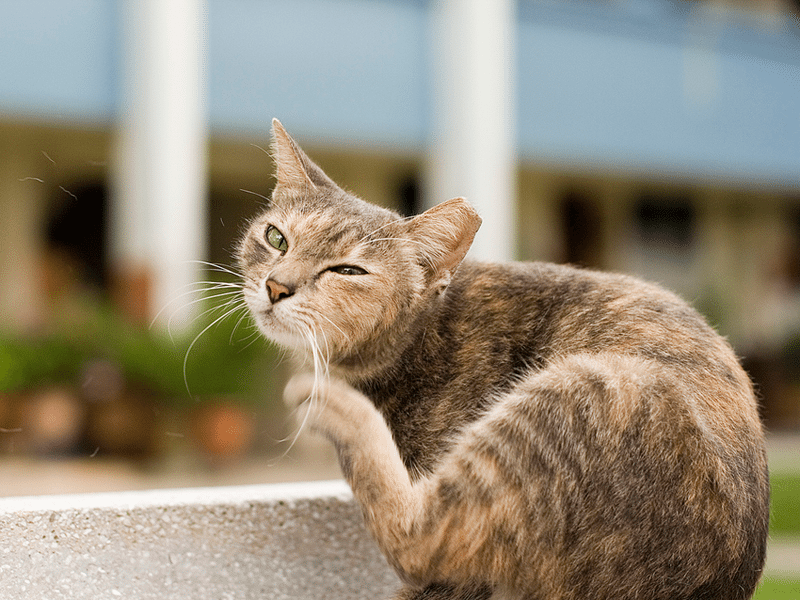If your Persian cat has been scratching in the sand and you notice their appearance has changed to that of a Sphynx, it may be time to contact your veterinarian in order to provide relief for their pet.
Pruritus in cats can be uncomfortable and cause more serious health complications if left untreated for too long, including extreme bleeding, loss of hair and pain. If it becomes severe and remains untreated it could even result in extreme blood loss and irreparable harm.
Cats often experience itchy skin for various reasons and to varying degrees. With assistance from your veterinarian, the source of their itching could be identified and treated before it worsens further.
Are You Wondering How I Can Stop My Cat From Scratching? Look No Further – here is all the information that you will need.
What Causes Itchy Skin in Cats? A cat’s itchy skin may be due to many different factors. Pinpointing the source is key as treatment options depend on it.
Reasons behind itchy skin in cats may include:
Ectoparasites (fleas, mites and lice) and bites from insects (mosquitoes Chiggers mosquitoes) should also be on your mind as well as environmental allergies such as food and environmental allergies as well as contact dermatitis.
Skin Inflammationss Cats often experience itchy skin conditions, including scratching and biting at their own skin, overgrooming, hair loss (particularly at the base of their tail and at the back of their knees) along with sores, scabs, or ulcerations of some sort.
Once you notice that your cat is experiencing constant itching, prompt treatment should begin immediately. A veterinarian can assist in diagnosing what may be the source of itching through various tests for diagnosis. If however, their condition worsens and they fail to respond to initial treatments, your vet might refer you to a board-certified dermatologist within the veterinary field who could perform further evaluation and provide additional recommendations as treatment plans.
How Can I Relieve My Cat’s Itchy Skin? Once the cause for your cat’s itchy skin has been established, your veterinarian will prescribe treatments tailored specifically to its source. This plan could include trial-and-error as you adjust dosages or add other therapies until finding one with sufficient effectiveness in terms of side effects mitigation – for instance some medications might only need to be given on an intermittent or seasonal basis while others require long-term commitment.
Cat Medicine for Itchy Skin

There are various methods available to you when treating cat itchy skin issues, depending on its cause. Your veterinarian can assist in selecting which options is appropriate for your feline friend – generally prescription-based solutions tend to be more efficient and safer than nonprescription alternatives, so listen to their advice.
Cat medications for itchy skin could include:
Monthly control of fleas requires immunosuppressant drugs, antibiotics and antifungals as well as immunotherapy shots (allergy shots) or Fluoxetine for control.
Monthly control of fleas
Prevention is of utmost importance when it comes to cats; fleas can be very troublesome for cats who suffer from allergies to fleas. Prevention is far more effective than treatment; cutting off fleas before they even have a chance to bite your cat is the key! Use only vet approved products when treating fleas as store bought flea treatments are typically ineffective and sometimes damaging; never use flea treatments designed for use on dogs on cats as these could prove lethal!
Home remedies to combat fleas should generally not be utilized; for optimal results, ensure you provide your cat with regular anti-flea medications year-round to extend his/her lifespan through even winter months. Even indoor cats require flea prevention measures; your vet can discuss various topical and oral prescription options to find one best suited to their lifestyle and to protect your cat against future infestation.
Immunosuppressive Drugs Immunosuppressive drugs are one of the primary sources of skin itching from allergies such as Atopic allergic dermatitis. There are various classes of medicine which fall under this category and each offers its own advantages and disadvantages, including:
Steroids such as oral prednisolone or dexamethasone injections or topical creams containing hydrocortisone could also help. Cyclosporine (Atopica) should also be prescribed while Oclacitinib, also known as Apoquel, may be used off-label to help treat canine allergies.
Steroids are typically safe and cost-effective remedies for feline allergic pruritus; however, prolonged use at high dosages may have undesirable side effects that include increased risks of contracting illnesses as well as diabetes mellitus. Furthermore, their use should not be undertaken for cats suffering from preexisting ailments like heart disease.
Antibiotics or antifungals Your veterinarian will treat any secondary infections with antifungals or antibiotics as needed, both topical and oral.
Therapy for Immunity: Your veterinarian dermatologist may recommend immunotherapy (commonly referred to as “allergy shots”). Pet owners should keep in mind that lokivetmab (Cytopoint) injections have been designed specifically for dogs and do not apply to cats.
Fluoxetine If none of your options have proved successful, your veterinarian may recommend prescribing Fluoxetine (“kitty Prozac”). While this medication is most often used to address behavioral issues in cats, it also contains anti-itch properties which may help control itching issues.
Topicals Not Exclusive to Prescription Only: Your vet may also suggest non-prescription products like Vetericyn Spray Duoxo S3 Calm MiconaHex plus Triz as possible options for your cat. Discuss this with them to see which of these might suit him/her best.
Home Remedies for Itchy Skin in Cats

Unfortunately, many homemade remedies designed to relieve itchy skin in cats are unsuitable due to lack of research studies on them and are usually ineffective or harmful – though coconut oil, apple cider vinegar and essential oils remain popular home solutions for itchy skin in felines.
Coconut OilCantaloupe oil contains essential fatty acids that provide essential building blocks for the skin. Coconut oil applied directly to the skin of cats generally poses no health risks and may even hydrate their skin, however excess usage could potentially cause stomach irritation if consumed through ingestion by their pets. Similar to oral supplements, topical ones containing essential fatty acids should also be avoided to reduce weight gain and diarrhea. Prescription-only options (like fish oil) might also be advised by your vet or doctor instead. To make your journey even smoother with topical solutions for topical use fatty acid supplements will also be provided here and discussed further on in this blog post.
Apple cider vinegar may not be effective at relieving skin irritation caused by fleas or infections, nor in oral use as a water-based additive. When applied topically it should be mixed with equal parts water for best results; otherwise it may irritate skin further. To use on skin it must first be mixed into a 50:50 mixture so as to not further irritate.
Essential Oils Essential oils have not been shown to be effective at eliminating fleas or treating itchy skin conditions in cats, and due to some being dangerously toxic for felines it’s best not to make use of them – rather consult with your veterinarian on more suitable products instead.
Avoid over-the-counter (OTC) products as well as human-grade solutions unless specifically recommended by your vet for your cat’s specific needs. OTC antihistamines such as Benadryl or other OTC antihistamines like diphenhydramine may not provide relief on their own; however, your vet might suggest them for extra support against itchy skin when used alongside prescription medicines.
Antihistamine prescriptions like chlorpheniramine may be more potency. Therefore, speak to your doctor prior to prescribing this antihistamine medication. Furthermore, please seek the advice of a veterinarian prior to using three antibiotic ointments such as Neosporin or topical creams containing steroids – they might be safe in certain circumstances, yet could prove unnecessary or even harmful (e.g. certain cats may experience negative side-effects due to polymyxin being present within triple antibiotics).
Cat Shampoo to Relieve Itchy Skin
Bath time can be stressful for both you and your cat; bathing together in a warm tub or using oatmeal-based natural formula shampoo will help relieve some itching while also helping remove allergens which could trigger inflammation in their skin.
Adams brand flea shampoos should not be used on cats with fleas as they may cause excessively dry skin and contain harmful chemicals like pyrethrins which could harm them further. Instead, consider opting for regular prescribed flea preventatives as these may provide more long-term protection than any shampoo alone can do.
If your cat suffers from skin infections or seborrhea, a veterinarian might recommend an antimicrobial shampoo with antiseborrheic qualities to combat both conditions. When selecting the appropriate product, please keep an eye out for ones designed to treat human psoriasis which contain tar, as these could prove extremely toxic for cats.
Cat Food for Itchy Skin
Diet may help ease itchy skin in cats who have an identifiable food allergy.
Diets designed to address food allergies tend to be tailored specifically for cats. These treats may contain food ingredients new to your pet (thus eliminating the opportunity for developing allergies) or hydrolyzed proteins designed to ensure their body can’t detect them as allergens. If you want to determine whether your cat has an allergy to food, the recommended approach is for them to consume a hypoallergenic diet for approximately 8 weeks without receiving treats, food items, supplements or medications of any kind besides hypoallergenic food items and treats from you and the vet. If their skin issues have improved and their allergy has been identified by this diet trial process then your vet might deem the trial successful (thereby identifying an allergy), keeping them on this particular diet indefinitely.
Cats that have been prescribed diets that can accommodate for their food allergies include:
Hill’s Prescription Diet z/d and Hill’s Prescription Diet d/d can both be found within this collection. Furthermore, Royal Canin Veterinary Diet Hydrolyzed Protein may also be added as additional options.
Purina Pro Plan Veterinary Diets HA Hydrolyzed
Either option should suffice; raw diets should only be considered by veterinarians unless advised otherwise. Remember that grains typically do not cause allergic reactions in cats; there’s no point using non-grain cat food as a primary solution to manage any itchy skin issues.
Even if your cat does not appear to have food allergies and is not on an anti-allergenic diet prescribed by their veterinarian, your vet might advise changing his food to one specifically formulated to address sensitive skin. Commercial sources offer Purina Pro Plan for Sensitive Skin & Stomach or Hill’s Science Diet Sensitive Stomach & Skin as two options that could improve his overall health by soothing his itchy skin.
Supplements for Itchy Cat Skin
To further alleviate itchy skin conditions in cats, your vet could suggest omega-3 fat supplements like those found in fish oils; omega-3s help support skin barrier health and can therefore be very effective at relieving discomfort.
Quality commercial cat food should provide adequate fatty acid levels in their diet, though some veterinarians may suggest oral supplements like Free Form by Elanco or salmon oil as additional source. Too much may cause digestive irritation.
Topical supplements, like Dermoscent Essential 6 Spot-On or Douxo Calming’s line of topical products, may benefit your cat’s skin by directly providing essential fatty acids for hydration on his/her face – more effectively than coconut oil applied topically.

